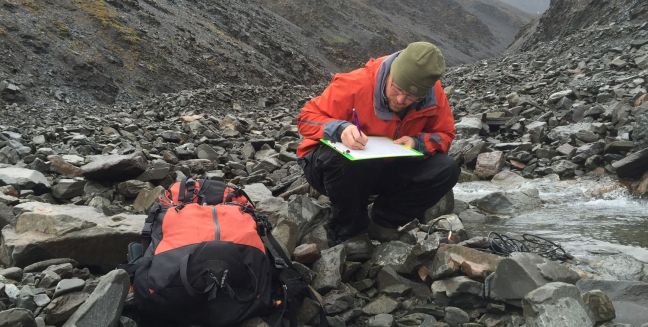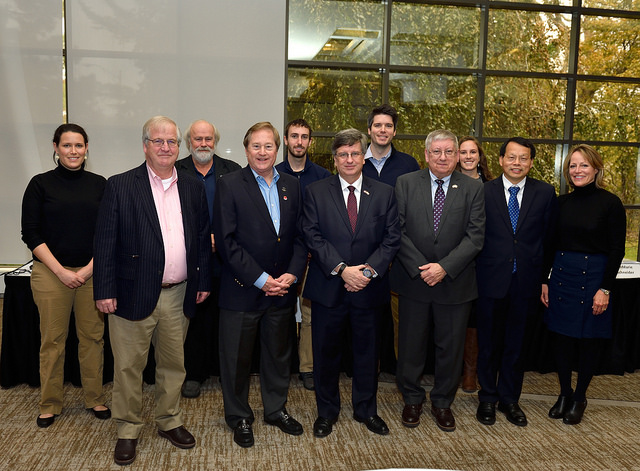The Arctic Research Platform invites faculty, students and community scholars as well as business leaders who are interested in a broad range of Arctic issues – from STEM to Social to Art Sciences – to a discussion engaging others with mutual or complementary interests.
An Overview of MSU’s Canadian Studies Center Arctic Research Platform 2015 - 2020
Background: A changing Arctic has long drawn the attention of environmental scientists. In more recent years, a trend toward warmer climates in the Arctic has caught the eye of supply chain, community development, and economic professions, as well as those with a watchful eye on geopolitics. More tourists and barges are passing through the Arctic. Indigenous peoples as well as native species are migrating or modifying their traditional way of life. While these changes may highlight opportunity, they also present unfamiliar challenges that need more observation in order to proceed wisely into the future.
The Arctic Research Platform invites faculty, students and community scholars as well as business leaders who are interested in a broad range of Arctic issues – from STEM to Social to Art Sciences – to a discussion engaging others with mutual or complementary interests. While encompassing the Canadian Studies Center priorities, the changing Arctic has at the center of recent activity, including sponsorship of roundtable discussions, support for visiting lectures, and funding off-campus research dialogue.
Activity: In the past five years, the Canadian Studies Center has hosted quarterly networking discussions with faculty regarding research interests and opportunities in a rapidly changing Arctic. Additionally, the Center has hosted a number of public events featuring well-noted Arctic scholars. For instance, in Spring 2017, a symposium featuring David Barber, University of Manitoba and Arctic Science Research Chair of Canada, was hosted along with a networking session for research faculty. In the same year, we hosted an Alaskan Arctic journalist, Margie Bauman, who is an MSU alumna reporting on fisheries and wildlife trends and their economic and cultural impact on Arctic industry and local communities. In November 2017, the center led a collaborative campus meeting and public lecture with Lawson Brigham, Distinguished Professor of Geography & Arctic Policy at the University of Alaska Fairbanks and a Senior Fellow at the Institute of the North in Anchorage. In addition, we connected with the University of Calgary where they house the Arctic Institute of North America and created a collaborative research and education agreement that provided reciprocal opportunities for students and faculty.
Here’s a summary of the CSC Arctic activities over the last five years:
1. Recruited and gathered MSU faculty and graduate student interests through a series of meetings with college and unit partners to plan Arctic-focused activities for the year
a. (CANR, ESPP, GEO, CERS, CSS)
2. Hosted campus visits of researchers recommended by faculty as notable in their field and as a possible collaborator, recruited sponsors from various colleges
3. Developed a poster session of Arctic-related research to increase awareness of work relevant to the Arctic
4. Distributed calls for proposals and funding opportunities through email and social media
5. Invited researchers from Canadian universities for purposes of team writing publications
6. Linked with main Arctic institutions, including the Arctic Institute of North America (AINA), resulting in reciprocal visits and funding applications for future collaboration, and the Arctic Research Consortium of the U.S. (ARCUS). Also aligned with faculty expertise at the University or Calgary, University of Manitoba, and University of Alaska Fairbanks. CSC hosted seven Arctic experts from various disciplines.
7. Built a team around funding proposals engaging domestic and international partners
8. Engaged graduate and undergraduate students in surveying notable publications and news outlets for Arctic coverage to distribute to interested faculty and students
9. Made on-campus, cross-disciplinary connections related to MSU Arctic interests – CANR, SSC, Nat Sci, Engineering, Business, GCFSI, James Madison and CAS
Objectives: The Canadian Studies Center launched the Arctic Research Platform to provide opportunity for faculty and students to:
1. Place interests and expertise in the context of the Arctic
2. Learn from and contribute to global discussions of a dynamic environment
3. Consider new funding information sources and prospects
4. Link with disciplines outside of their own and in sync with sophisticated researchers from cross-border institutions
5. Engage a science network from other world regions to study the Arctic landscape
6. Call on multiple stakeholders, including policy, industry and community to work together to study a rapidly changing environment.
Encompassing the Canadian Studies Center priorities, the changing Arctic has been a major focus of the center's recent activity, including sponsorship of roundtable discussions, support for visiting lectures, and funding off-campus research dialogue.
A changing Arctic has long drawn the attention of environmental scientists. In more recent years, a trend toward warmer climates in the Arctic has caught the eye of supply chain, community development, and economic professions, as well as those with a watchful eye on geopolitics. More tourists and barges are passing through the Arctic. Indigenous peoples as well as native species are migrating or modifying their traditional way of life. While these changes may highlight opportunity, they also present unfamiliar challenges that need more observation in order to proceed wisely into the future.
Kaishi Chhabra, CSC professional writing intern, sat down with Dr. Jay Zarnetske and Dr. Arial Shogren to discuss rapid changes in the arctic. How does their unique research focus on climate change and permafrost? Click here to read the full article to learn how these dedicated researchers are answering the big questions.
A warming trend in the Arctic has caught the eye of a broad area of research expertise. The Arctic has seen more tourists passing through, along with more sea and air traffic. While these trends may highlight opportunity, they also present unfamiliar challenges that need more observation in order to proceed wisely into the future.

Front Row (left to right): Dr. David Closs, James Blanchard, Counsel General Douglas George, Dr. Lawson Brigham, Dr. Jianguo (Jack) Liu, AnnMarie Schneider Back Row (left to right): Kelsey Nyland, Dr. Fritz Nelson, Clayton Queen, Grant Gunn, Kelly Kapsar